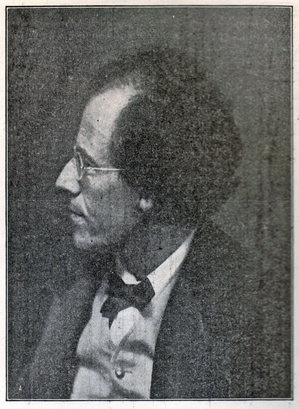THE death of Gustav Mahler, on May 18, in Vienna, was a shock to the entire musical world. A biography of this great composer-director was given in the May issue of THE ETUDE in connection with what was doubtless his last statement of musical consequence. THE ETUDE had little idea that it was to have the melancholy honor of publishing the “swan song” of this famous master. He was very averse to being interviewed, contending that an interview would be construed as an attempt to push himself forward, or as a bid for publicity. He was quite willing to give our readers the benefit of his opinions, but his genuine modesty and retiring disposition was almost pathetic, as he dreaded the limelight, and desired to be known only through his work as a conductor and as a composer.
 In addressing our representative he said that he had long since ceased to read musical criticism in the papers. He claimed that they annoyed him quite as much when they were good as when they were bad. This general animosity to the critic made many enemies for him, and some did not hesitate to express themselves very freely over his work. Accustomed by long years of service in Europe to expect a kind of military obedience to all of his commands, his path in America was by no means an easy one. Nevertheless, he produced results in opera and in concert with the New York Philharmonic that will long be remembered.
In addressing our representative he said that he had long since ceased to read musical criticism in the papers. He claimed that they annoyed him quite as much when they were good as when they were bad. This general animosity to the critic made many enemies for him, and some did not hesitate to express themselves very freely over his work. Accustomed by long years of service in Europe to expect a kind of military obedience to all of his commands, his path in America was by no means an easy one. Nevertheless, he produced results in opera and in concert with the New York Philharmonic that will long be remembered.
Mahler was a kind of human dynamo with hardly flesh and blood enough to conceal the coils and magnets. For many years he had been nervous to the point of explosiveness. His memory, training and natural ability as a conductor were nothing short of marvelous. In his attire he was simple to the point of being ascetic. In fact, when his slender little body, with its distinctive individuality, came between the orchestra and the audience the audience was at once impressed that the man was a real master—such a master as one might have expected to see walking in the streets of Leipsic or Vienna one hundred years ago. Although receiving the highest salary ever paid to a conductor in America or in any other country, Mahler gave no indication of being mercenary. His salary came to him because he was the one man in the world who could command it.
In his interview for THE ETUDE Mahler laid great stress upon the importance of the folk-song in early musical education. He told our representative that while the melodies he employed and the themes he used were quite original, he felt his mind wandering back to the old Bohemian folk-songs he heard when he was a boy. Mahler was inclined to look with disdain upon the assistance he had received from his teachers, and claimed that those who would compose must learn to depend upon themselves. Although he had been a pupil of as famous a master as Bruckner, he waived aside the fact of having such a training and claimed that he had been obliged to work out his own musical salvation.
As a composer Mahler will be known principally through his eight symphonies. He has also composed a few choral works of significance, including Das Klagende Lied. The two operatic works with which he is credited by the Grove dictionary we know, upon the composer’s own authority, to be merely sketches or outlines which he never had the time to develop as he desired. The nature of his works makes it unlikely that he will become well known to the public of the future as a composer. A symphony, particularly a Mahler symphony, demands a large body of men to give it a tonal existence. Mahler wrote practically nothing in the smaller forms by which he will be remembered. His orchestral effects were startling and contrived with great ingenuity. His intimate knowledge of the possibilities of the orchestra gave his musical ideas a kind of fluency of expression which enabled him to employ many effects which others would have found it extremely difficult to secure. He was invariably ranked with Strauss and Reger as one of the greatest composers of our time.



